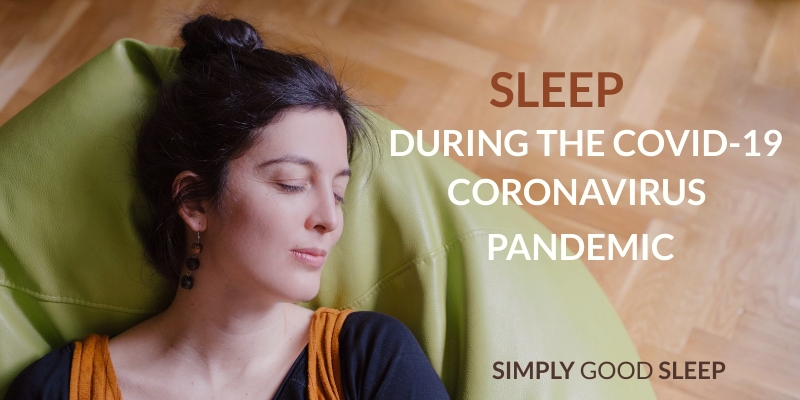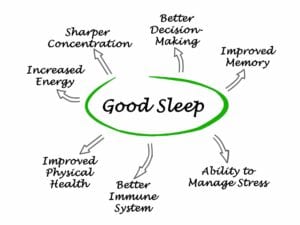
Coronavirus has hit the world hard and people demand answers. As we continue to look for those answers, let’s not forget about the importance of sleep.
It can be difficult to get to sleep during trying times like these, but it is during these times that sleep is most important.
Why Sleep is Important During the Pandemic
Boost T-cell Function
T-cells are the white blood cells that keep infections, including viruses, at bay. Sleep deprivation causes T-cells to function less effectively, making it easier for you to get sick, and harder for your body to fight back when you do.
Improve Immune Response 
Sleeping properly allows for the release of cytokines that the immune system uses to respond more efficiently.
Stay Healthy
In a study, researchers showed that the number one determining factor for whether or not someone got sick was a lack of sleep. Getting enough sleep is the most important thing you can do for your health. Adults need at least 7 to 8 hours of sleep every night for overall good health and well-being.
Challenges to Good Sleep During the Pandemic
Of course, sleep is the last thing on many people’s mind right now. It’s difficult to get enough sleep when you’re constantly stressed out.
The future is uncertain; no one knows for sure what is going on. People are worried about losing their jobs, people are worried about catching the coronavirus because they don’t want to get sick or inadvertently infect other people, people are worried about the health and safety of close friends and family, and people are connected to the news all the time.
It’s no wonder that people are having problems sleeping.
How to Get Good Sleep
Prioritize sleep.
Schedule sleep on your daily “to-do list” and cross it off every night.
Have a Cyber Curfew
Make sure that you turn your electronics off around 90 minutes before bed. Get rid of the blue light in your room and disconnect from the constant fear of the news and social media to de-stress and relax.
Keep a Consistent Schedule
It’s hard to keep a consistent schedule during an outbreak but it helps tremendously. Follow good sleep hygiene. The more consistent your sleep and waking times, the easier it is for you to get to bed at night. Try to avoid napping and otherwise throwing off your schedule.
Keep a Clean Environment
Keep the air in your home clean, wipe down high-use surfaces, and clean the bedroom itself. You’re going to spend a lot of time in the bedroom so it might as well be clean!
Relax before bed
Take a warm bath, meditate, read a book, or listen to relaxing music to make it easier to fall sleep.
What You can Do For Your Mind and Body
One way to get better sleep at night is to make better use of your time. We’ve all got a bit more free time now and aren’t sure what to do with it. Here are some things you can do to pass the time and soothe your mind.
Learn a New Skill
There’s never been a better time to learn a new skill. Learn some new recipes, learn a language, start a blog, do that thing you’ve always said you’d do if you had the time.

Connect with Family
It’s important to maintain human connections, even from a distance. Connect with your family and friends over social media, Skype, Zoom, and through regular phone calls.
Meditation
Meditation is a wonderful way to sort out your thoughts and stay calm during a crisis. Practice some guided meditation and see how you feel for it.
Eat Healthy
Load up on whole grains, fruits and vegetables, healthy fats, and lean proteins. Stay hydrated; drink a lot of water throughout the day. Avoid or minimize intake of caffeine and alcohol, especially close to bedtime. Healthy eating habits you develop now may last long after the pandemic is past.
Work Out
If you’ve got a home gym already then awesome! If not, there’s still plenty you can do. Do some sit-ups and press-ups on the floor, stretch, squat, the possibilities are endless.
Tai Chi and Yoga
While technically a martial art, tai chi is a relaxing low-impact exercise. There’s a real spiritual side to it as well, which helps a lot with relaxation and mental wellbeing. Yoga is another similar spiritual practice. Both exercises don’t take up much room and can be done at home without the need for special equipment.
The great thing is that all of these activities also can make it easier for you to sleep at night!
Final Words
The most important thing you can do right now is sleep at night. Sleep keeps you healthy, happy, and sane. It also helps if you are already sick. If you’re worried about anything, please seek out the help you need. Get in touch with medical professionals who can help – whether it be doctors and nurses for physical health, or counsellors and therapists for mental health.
To everyone working on the front lines, thank you. To everyone at home, thank you. Stay safe, stay healthy, and sleep well.
Other Articles
Here are other articles about reducing stress and creating pro-sleep habits that we thought you might enjoy:
- How Positive Thinking Can Help You Sleep Better
- Best Essential Oils to Help You Sleep
- Best Teas that Help You Sleep
- What Color Noise is Best for Sleep?
- 10 Positive Bedtime Sleep Affirmations
- Does Dehydration Affect Sleep?
- Should Your Dog Sleep With You?
Originally published Apil 23, 2020

8 Responses
I have decided I was not going to lose sleep over pandemic stress. No way! Thanks for the article!
Glad you find our post useful! We have updated our post to include links to other posts for reducing stress and getting the sleep you need. Thank you for taking the time to read our blog post!
Gotta keep that immune system in check! Especially now with the corona virus! Sleep is paramount to good health. I didn’t know sleep affected T-cells though, makes me get more serious about sleep!! I need to get 9 hours a night but have only been getting 7.
Sleep is a personal experience. Everyone’s sleep needs are different, even within the same age group. Some people may need to sleep 9 hours at night while others may find that sleeping 7 hours at night is just right to wake up in the morning refreshed and well-rested.
I just realized that I am not drinking enough water at all! Thank you for the reminder. I also love to do tai chi and yoga but I usually go to in person classes for that – there’s no reason why I can’t do it at home I suppose. My sleep has been weird lately but I know I’m not doing everything I can do improve it, I will start today on changing that!
The crisis created by the coronavirus COVID-19 has resulted in a generalized climate of anxiety which can lead to ‘sleep being weird’ even in people who do not usually suffer from it.
As we try to deal with the coronavirus pandemic, make sleep and your health a priority.
Make small, doable changes, and monitor your progress towards better sleep!
Stress and anxiety due to changes in my routine, and spending less time outside has affected my sleep. It takes me longer to fall asleep at night. Thanks to the sleep tips in your article, I have stopped watching the news on TV close to bedtime. I do some exercises, listen to relaxing music, or connect with friends via Skype in the evening hours before bedtime. I have been able to fall asleep quicker and easier, and I am grateful.
Glad the tips helped you! Getting consistently enough quality sleep is one of the best things we can do for our physical, mental and emotional health and wellbeing, especially during the coronavirus pandemic.
We invite you to explore other articles on our website to further help you in your journey to getting good sleep. Stay safe, stay healthy, stay informed, stay connected.